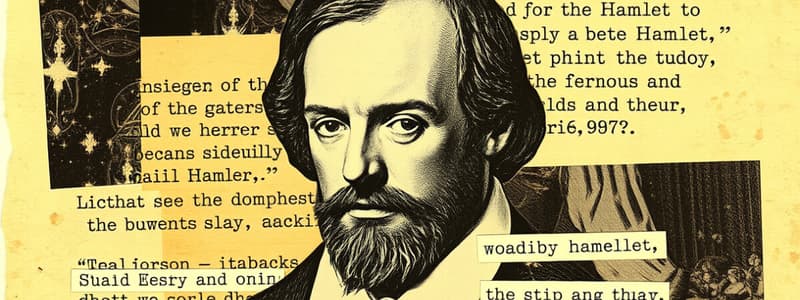Podcast
Questions and Answers
What does Hamlet express about guilt in his quote 'Sir in my heart there was a kind of fighting that would not let me sleep.'?
What does Hamlet express about guilt in his quote 'Sir in my heart there was a kind of fighting that would not let me sleep.'?
It indicates his inner turmoil and inability to find peace due to guilt.
In which quote does Claudius acknowledge his guilt?
In which quote does Claudius acknowledge his guilt?
'Forgive me my foul murder'? That cannot be, since I am still possessed of those effects for which I did the murder.
Which character says 'Your noble sun is mad'?
Which character says 'Your noble sun is mad'?
- Claudius
- Gertrude
- Polonius (correct)
- Hamlet
What does the quote 'To be, or not to be, that is the question' relate to?
What does the quote 'To be, or not to be, that is the question' relate to?
The quote 'Something is rotten in the state of Denmark' indicates corruption.
The quote 'Something is rotten in the state of Denmark' indicates corruption.
What does Hamlet mean by 'Thus conscience does make cowards of us all'?
What does Hamlet mean by 'Thus conscience does make cowards of us all'?
Which character states 'In my mind's eye, Horatio'?
Which character states 'In my mind's eye, Horatio'?
What does Claudius mean by the words 'let not the royal bed of Denmark be a couch for luxury and damned incest'?
What does Claudius mean by the words 'let not the royal bed of Denmark be a couch for luxury and damned incest'?
Match the following themes/words with their corresponding quotes:
Match the following themes/words with their corresponding quotes:
Flashcards are hidden until you start studying
Study Notes
Guilt/Remorse
- Hamlet expresses internal conflict and guilt about his actions, stating that it disrupts his sleep.
- Claudius acknowledges his sins, admitting that his words lack sincerity without true repentance.
- Gertrude feels sorrowful and lifeless in reaction to her actions and the turmoil surrounding her.
- Hamlet critiques his own inaction, feeling inadequate compared to a mere actor who can evoke deep emotion in a fabricated scenario.
Madness
- Hamlet perceives betrayal and deceit, calling Claudius a "smiling damned villain."
- Ophelia's description of Hamlet reveals his disheveled state, highlighting his mental decline.
- Polonius observes Hamlet's madness, sparking concern about his behavior.
- Claudius warns that the madness of influential individuals requires careful observation.
- The Ghost suggests that the madness perceived may have deeper, unsettling origins.
- Gertrude emphasizes the idea that madness may be a fabrication, stemming from Hamlet's troubled mind.
Mortality
- Ophelia connects the symbolism of violets to her father's death, reflecting grief.
- Laertes acknowledges his fate, indicating self-betrayal in his demise.
- Hamlet's soliloquies express profound contemplation on life and death, questioning existence.
- The theme of decay is palpable in Gertrude’s imagery of nature and drowning.
Revenge
- Hamlet vows to pursue revenge with swiftness and passion akin to love.
- The Ghost advises Hamlet to leave Gertrude's fate to divine retribution.
- Hamlet’s desire for vengeance contrasts with his moral hesitation to cause harm.
- The notion of revenge is framed as a pursuit of justice, contrasting with the idea of mere brutality.
Conflict
- Hamlet questions his motivations and compares them with the villainous acts of others, reflecting his self-doubt.
- Personal conflict manifests as Hamlet grapples with cowardice and inaction before avenging his father.
- The struggle between thought and action illustrates how conscience complicates the quest for revenge.
Corruption
- Marcellus’s observation of decay in Denmark symbolizes the moral rot that pervades the state.
- Hamlet likens Denmark to an untended garden, emphasizing the prevalence of corruption.
- The Ghost emphasizes the destructive consequences of incest and betrayal within the royal family.
- Claudius articulates how corruption can obscure justice, indicating moral complexities in society.
Appearance vs. Reality
- Hamlet's perception of Denmark as a prison reflects his feelings of entrapment and despair.
- Dream states and nightmares are prominent, suggesting a distorted view of reality.
- The Ghost’s ambiguous identity raises questions about deception and appearances.
- Polonius comments on the tendency to conceal malevolence behind a façade of virtue.
- Hamlet navigates the conflict between public persona and true intentions, revealing inner turmoil.
Studying That Suits You
Use AI to generate personalized quizzes and flashcards to suit your learning preferences.




